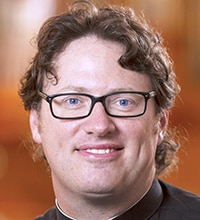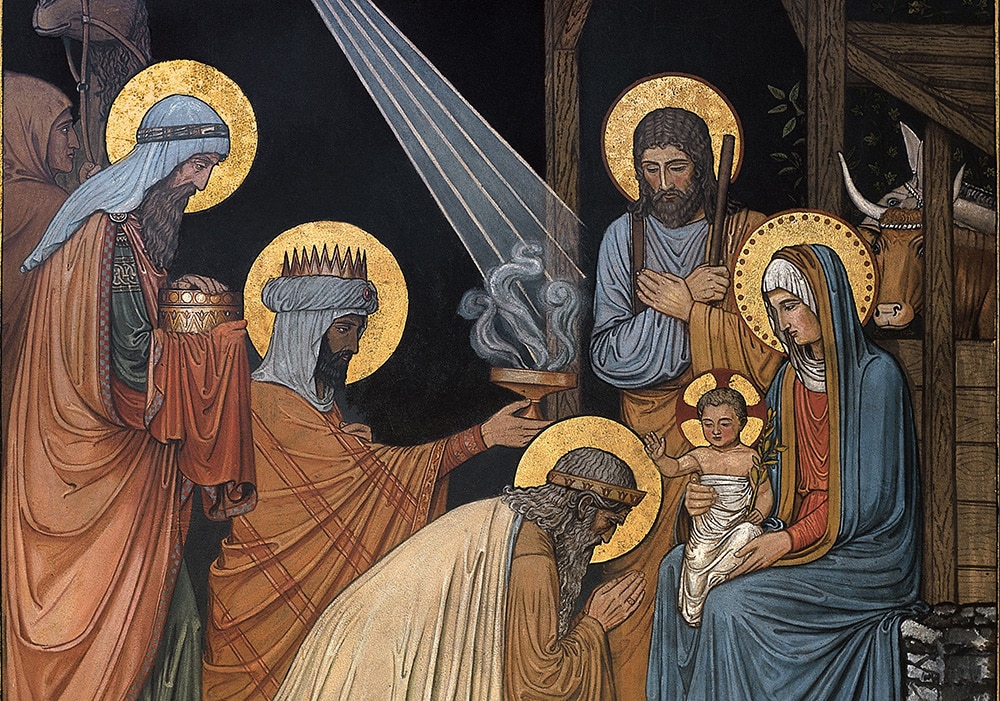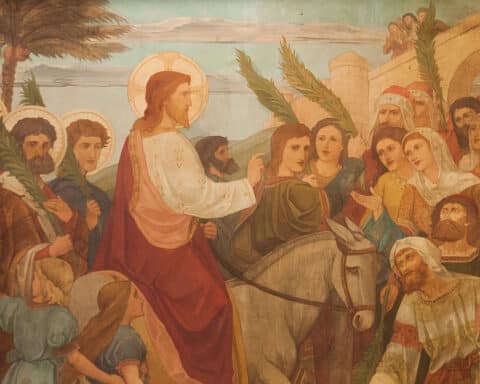
Now, what this means is that what we watched for during Advent and celebrated at Christmas in that little birth, that small miracle of “wondrous humility,” as St. Augustine called it, and what we cherished in that little holy family is that its significance, it turns out, is eternal; its salvific scope is cosmic. As St. Ephrem wrote, “Blessed is your birth that stirred up the universe!” The Epiphany, like light in a dark world, reveals what Christmas means: that it involves everyone and everything, leaving nothing unchallenged and unchanged, that it’s salvation is meant for all.
The Epiphany is a feast overflowing with the mysteries of Christ. It’s marked traditionally by the tria miracula, by the “adoration of Jesus by the wise men (Magi) from the East, together with his baptism in the Jordan and the wedding feast at Cana in Galilee” (CCC, No. 528). Throughout the history of this feast, each of these mysteries has at various times taken center stage. Only lately in the West has the Baptism of the Lord been celebrated the following Sunday; and we’ll celebrate the Wedding at Cana the Sunday after that. The history and rituals of this feast I’ve always thought beautifully confusing and blessedly chaotic, like a liturgical party got out of hand. Again, I think of St. Ephrem’s image of Christ’s birth stirring up the universe. That’s what the Epiphany suggests, that the birth of Jesus is the cause of all it — the conversion of pagans, the sacraments, the signs of heaven, the Paschal Mystery, the marriage supper of the Lamb.
| January 2 – The Epiphany of the Lord |
|---|
|
Is 60:1-6 |
Which, of course, has always been the plan. It goes back to the promise made to Abram, that he would become Abraham, the father of a “great nation” in whom “all the families of the earth” will find blessing (Gn 12:2-3). It’s what Isaiah saw in prophecy, that the mountain of the house of the Lord would be established as the highest mountain, and that “all nations shall stream toward it” (Is 2:2). It’s what Simeon saw and spoke, holding the infant Christ in his arms, that this child is a “light for revelation to the gentiles” (Lk 2:32). It’s the “mystery” given to Paul by revelation, that in Christ the gentiles, who were once “far off” have been brought near by the blood of Christ (Eph 3:3; 2:13). And it’s what John saw, the “great multitude, which no one could count, from every nation, race, people, and tongue” (Rv 7:9).
The Epiphany is the incarnate beginning of all of this, and it bears the simple reminder that all of this also includes you, no matter who you are — all of us. We, who were far off, are now brought near in an adoration that will become discipleship, then death, then resurrection, and then eternal adoration, together with everyone else, all of us faithful receivers of this immense grace.
Which is where the Magi come in, where they teach us. They show us how to encounter and receive this Christmas grace. Erasmo Leiva-Merikakis, in his beautiful meditation on Matthew’s Gospel, writes that although the Magi are pagans, still they represent “the docile openness and readiness to obey the truth.” Christ has come, and the Magi show us how properly to respond — to seek him, to go to him, to adore him. That the Magi are not Jews tells us this journey is open now to all of us, anyone wise enough to go in search of him.
Which is the moral question of the Epiphany: Are we wise enough to seek him? This is a question not just for unbelieving seekers of truth, but for believers, too. Before this great mystery, as Paul called it, the great work of God for our salvation in Christ, how might we believers live the virtues of the Magi? How might we open ourselves more radically to the truth of Jesus? How might we seek him better? That is, what’s the character of our Christian search? Do we seek Jesus to adore him as the Magi did? Or, do we seek Jesus as Herod did, to destroy him and to keep ourselves the king? Christ has drawn near, and we’re to seek him. But how? That’s a good question for the rest of this new year.
Father Joshua J. Whitfield is pastor of St. Rita Catholic Community in Dallas and author of “The Crisis of Bad Preaching” (Ave Maria Press, $17.95) and other books.





